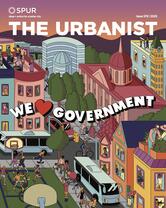Issue 578 /
Fall 2025
We (Heart) Government
We’re Not Waiting to Be Included
In East San José, a model of local governance shifts decision-making to those closest to the challenges — and the solutions.
Governance is not about symbolic representation. It’s about power: who holds it, who sets the agenda, and whether systems are built with communities or imposed on them. In East San José, residents are choosing the former and building what they've long been denied.
Governing Across Boundaries
How a collaborative approach to governance can bridge the region’s complex systems — and address its challenges
The San Francisco Bay Area is one of the most prosperous regions in the world but prosperity has not been equitably shared, and our governance structures haven’t kept pace with the region’s growing complexity. The challenges we face — a housing shortage, climate change, economic inequality, aging infrastructure — are regional in nature. If we are to meet this moment, we need regional governance systems designed to respond at the right scale, with the right tools.
Achieving Transit Accountability in California
As the state government is asked to commit more resources to locally controlled transit agencies, thinking strategically about accountability can help ensure that California’s riders and taxpayers get their money’s worth.
Public transit systems across California are experiencing a financial crisis, with ridership and fare revenues remaining depressed as inflation and tariffs push costs higher. As Sacramento is asked to commit more resources to agencies that are locally controlled, the question of how to ensure that transit is “accountable” to lawmakers, taxpayers, and riders looms large.
Building Relationships to Build Housing
How five years of advocacy at the state and local levels is turning the tide in favor of new housing
After decades of failure to build enough homes pushed prices to a crisis point, California policymakers and their constituents began to reconsider their resistance to new housing construction. Years of education and advocacy by SPUR and other housing supporters is now starting to turn the tide in favor of new housing.
A New Governance Model for Downtown Revitalization
How can Bay Area cities be empowered to reinvent themselves without repeating the mistakes of urban renewal?
The downtown districts of San Francisco, San José, and Oakland all face high office vacancies and shuttered storefronts as hybrid workplaces and declining tourism lower the daytime population. As cities grapple with an oversupply of commercial spaces, leaders have an opportunity to revitalize downtowns in a way that creates more housing opportunities, enhances economic mobility through small-business ownership, invests in public infrastructure, and nurtures arts and culture organizations.
Governing Adaptation
Why the Bay Area needs regional action on sea level rise
Meeting the challenge of sea level rise in the San Francisco Bay Area will require cities and counties to work together on adaptation efforts. Several promising local governance structures are already demonstrating how communities can work together on legally mandated subregional shoreline adaptation plans.
SPUR Member Profile: Claudine Cheng
Connecting the dots between the arts and the health of cities
Claudine Cheng is an attorney specializing in regulatory compliance, corporate governance, and land use in San Francisco. A community advocate and activist, she believes that one of the most powerful tools for city wellbeing is a strong arts and culture scene. We asked her about the role arts and culture initiatives play in a city’s health.
Business Member Profile: Port of Oakland
A bold strategic plan for the future of “Everyone’s Port”
The Port of Oakland, a SPUR business member since 2015, recently adopted a bold strategic plan for 2025–2030. From reducing emissions and modernizing infrastructure to fostering inclusive economic growth, the plan provides a blueprint to meet the challenges of the post-pandemic economy, climate change, and geopolitical uncertainty. We spoke with Executive Director Kristi McKenney about the priorities embedded in the new strategic roadmap.
